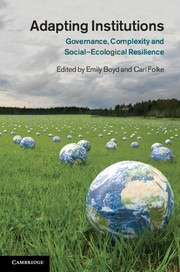Book contents
- Frontmatter
- Contents
- Illustrations
- Contributors
- Foreword
- Acknowledgements
- Acronyms and abbreviations
- 1 Adapting institutions, adaptive governance and complexity: an introduction
- Part I Adapting local institutions, networks, leadership and learning
- Part II Adapting and governing public institutions for uncertainty and complexity
- 6 Adaptive capacity and the ecostate
- 7 Food systems and adaptive governance: food crisis in Niger
- 8 Public–private partnerships in the provision of environmental governance: a case of disaster management
- Part III Adapting multi-level institutions to environmental crisis
- Index
- References
6 - Adaptive capacity and the ecostate
from Part II - Adapting and governing public institutions for uncertainty and complexity
Published online by Cambridge University Press: 05 November 2011
- Frontmatter
- Contents
- Illustrations
- Contributors
- Foreword
- Acknowledgements
- Acronyms and abbreviations
- 1 Adapting institutions, adaptive governance and complexity: an introduction
- Part I Adapting local institutions, networks, leadership and learning
- Part II Adapting and governing public institutions for uncertainty and complexity
- 6 Adaptive capacity and the ecostate
- 7 Food systems and adaptive governance: food crisis in Niger
- 8 Public–private partnerships in the provision of environmental governance: a case of disaster management
- Part III Adapting multi-level institutions to environmental crisis
- Index
- References
Summary
Introduction
Contemporary discussions on issues of resilience and adaptation in linked social–ecological systems (SES) have, to a large extent, overlooked the state as an object of study and theorising. This is unfortunate, since the state, despite continuing globalisation, remains a primary unit of environmental decision-making, management and policy-making. Failing to include the state as a relevant unit of analysis in social–ecological system studies therefore carries the risk of omitting perhaps the single most influential source of agency in contemporary environmental management.
A closer look at the nation-state reveals that there is already an extensive and growing set of governance systems, aimed at regulating the use of natural systems, in place in most industrialised countries. This rapid process of capacity-building has been going on since the 1960s. This trajectory towards what can be called an emerging environmental state (or ecostate) is a highly critical development for anyone wishing to understand how the current ecological crisis can be, and has been, addressed through administrative means. Although the emergence of ecostates marks a significant development in how societies are responding to environmental degradation, it can still be questioned how well ecostate governance systems are suited to the task of governing complex and volatile ecological systems. SES scholars have long emphasised that to achieve long-term robustness, the governance of complex ecological systems must have a sufficient level of adaptive capacity (Ostrom 2005, Folke 2006, Duit and Galaz 2008). A key challenge for the study of ecostates is therefore to develop a framework for assessing the level of adaptive capacity of different types of ecostates.
- Type
- Chapter
- Information
- Adapting InstitutionsGovernance, Complexity and Social-Ecological Resilience, pp. 127 - 147Publisher: Cambridge University PressPrint publication year: 2011
References
- 1
- Cited by



